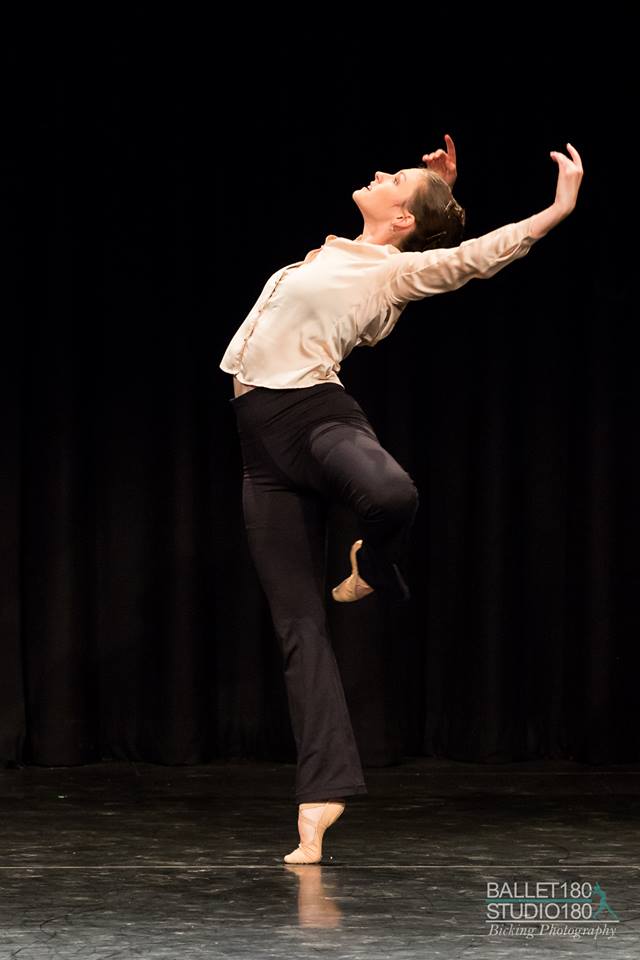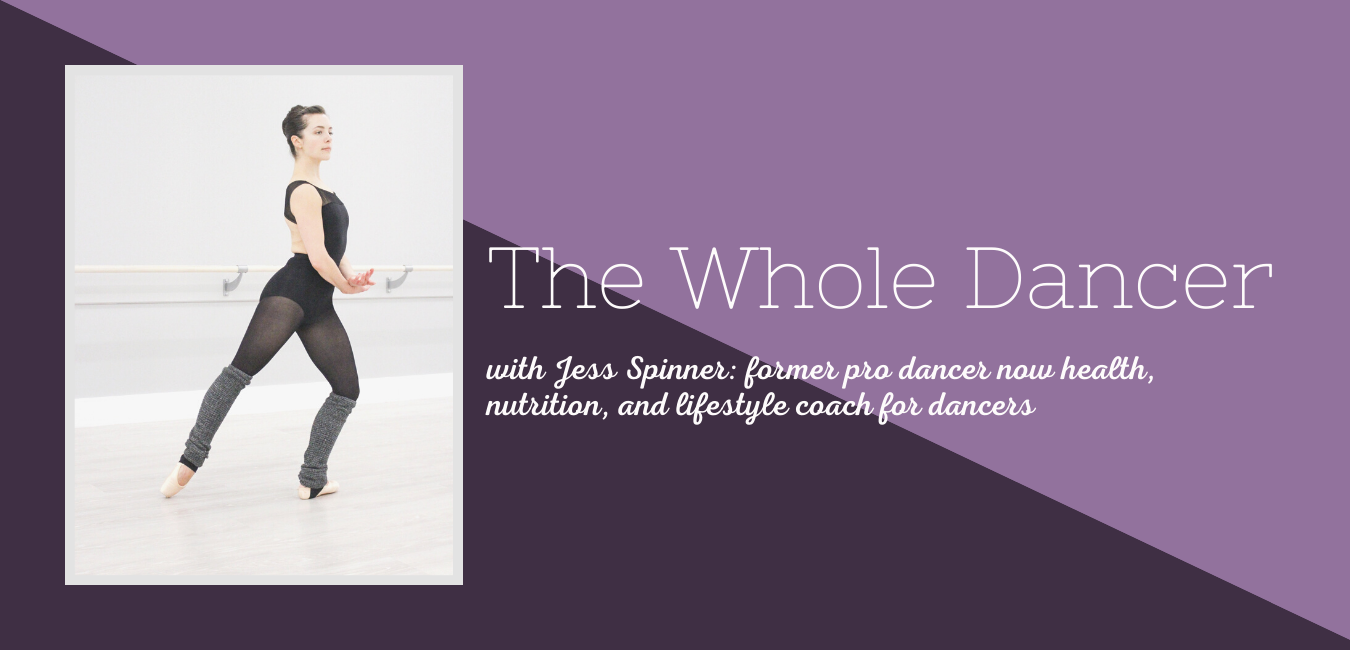You don’t wake up one morning and decide, I’m going to torture my body and mind by starting an eating disorder today. It’s something that develops over time.
I can trace my eating disorder back to when I was 15. I was at a nutrition lecture at a ballet summer program. The nutritionist took a tub of Crisco and dumped it onto a student’s hand and said, “That’s a donut.” I haven’t eaten a donut since.
That summer I decided that I would only eat junk or dessert on weekends. I would turn down offers of Skittles, Swedish Fish and other sweets or snacks from friends at lunch during school. They thought I was just being a crazy dancer. Some admired me for being so disciplined and focusing on my health.
When I got to college, my habits escalated. I was deathly afraid of gaining the Freshman 15. My class and rehearsal load was significantly less than the schedule I had in high school. As a result, I spent more time in the gym and Pilates studio.

With my spare time, I went through Pilates Mat Instructor training. I didn’t have time for lunch in between technique classes, so lunch was often an apple and a Luna bar. I would freak if I didn’t eat at least one salad per day.
Many students got sick from eating ill-prepared meat from the dinning halls, so I was terrified of eating chicken on campus. I couldn’t get into the social life because on weekends everyone drank like fish. As a control freak, I had problems letting go.
But what really got me was the constant mental reminder: alcohol is calories. I would spend extra time in the gym punishing myself for a night out drinking. It should have come to no surprise to me that I had a stress fracture in my left fibula after my first semester.
I moved back home when I got my first professional contract. I was living with my parents and food issues subsided a little. But lunch was a meal I continued to avoid. During rehearsal periods, I would get 15, maybe 20-30 minutes for lunch. I was doing contemporary ballet rep that involved a lot of partnering and getting thrown around. I didn’t want to upchuck on my partner, so lunch was often limited to an apple, some kind of veggie, and maybe a handful of granola. I would then go home and have a huge dinner.
From 18-21, my weight fluctuated depending on injuries, how much I was dancing, and the rep I was dancing. I subconsciously lost weight to fit a costume that was two sizes too small for me, but that’s what my cast A counter-part wore, so I had to wear the same costume.
When I was 20, I practically lived on my own while at a summer program. I lost the weight I gained while out on an injury, and then some. People kept telling I looked really skinny. I took it as a complement, but looking back that’s when people started to show their concern.
I remember one of the guys I was dancing with telling me I should go eat a bag of chips. Another dancer told me I should go eat a sandwich. I wasn’t getting the hints.
The following summer, I lost even more weight between long class and rehearsal days, sweating in the Florida heat, and unappetizing options at the dining hall. I liked how skinny I was then and I wasn’t going to change that.

My fellow dancers showed concern but not enough to right out say something. At that point I was living on my own, so my food accountability was non-existent. If I didn’t feel like making dinner, I would just snack on veggies, nothing that amounted to a full meal.
In February 2015, I finally realized I had a problem. I turned to my roommate at the time and admitted I have a problem. Her first response was: “I know. I figured that out within a week of moving in with you.” A month later, I was visiting my doctor for a sinus infection, when I admitted I didn’t have a good relationship with food. She referred me to The Renfrew Center.
On April 13, 2015 I checked myself into the Renfrew Center’s Intensive Outpatient Program. It was three evenings a week, three hours each day. An average day included a group session, dinner, and a second group session. These days were also supplemented with individual weekly therapy sessions, and dietician meetings.
In my second group meeting on my first day, we did an exercise called voices not bodies. We talked about how you have to use your voice, not your body, to communicate what you are feeling. Verbally tell someone you’re hurting instead of denying yourself the fuel it needs.
It clicked that that is what I had been doing to my body since I was 18. When I got to my car that night, I cried out of relief. I was no longer alone. There was a whole group of women who had the same problem as me, and were working together to change that.
I discovered why I started my eating disorder in the first place. I learned that my root mental problem was: I’m not good enough (which sounds familiar to any dancer).
I learned coping methods for stressful food situations and how to prevent myself from using eating disorder symptoms to handle life’s stress. I learned that an eating disorder is a very lonely disease.
It’s a secret filled with shame that you keep locked inside. The first thing you learn in recovery is that you are not alone. There are people who want to heal just like you, and there are people that want to help you heal.
I met the most incredible women at Renfrew, both staff and fellow patients. It was great having a fantastic support system for seven weeks who were so invested in your life and progress. We would have check ins and the beginning and the end of the week to see how you were coping with stress, adjusting to new food plan or therapies, or life happenings.
The most important thing I learned was how to eat a healthy amount every day. I had to relearn natural eating habits. I had a meal plan that outlined how many servings of each type of food I should be getting.
We had to learn what was considered a serving with the Renfrew system. I still do a mental meal plan check in to see how I’m doing some days, seeing if I’m getting enough nutrition.
The fun part of treatment was rediscovering the love of food and cooking. For therapy homework I was instructed to try new foods and recipes. I found what was comfortable and safe food, and ventured into what was exciting and new.
I learned how meal prep is so key for stressful weeks and long rehearsal days. I’ll make a large batch of something (for example fried rice with veggies, or quinoa with chick peas and veggies) for dinner, which will also be lunch for the next 2-3 days.
 Dancing during recovery was certainly a process. As part of my recovery, I had to gain five pounds to get to a healthy weight. It doesn’t sound like a lot, but it felt like a lot.
Dancing during recovery was certainly a process. As part of my recovery, I had to gain five pounds to get to a healthy weight. It doesn’t sound like a lot, but it felt like a lot.
The summer following my treatment I would look and the mirror and I wasn’t sure what looked good or what looked healthy. I wish my treatment had included how to look at yourself in the mirror, but I was the only dancer in treatment, so the topic never came up.
If anything they encouraged us to stay far away from mirrors. It took at least a year until I actually could look at myself in the mirror and be ok with what I saw (though we all sometimes have rough days). On the positive side, it felt so good to have more energy for class and rehearsal.
Going through treatment made me realize how hyper-focused I was on ballet. It made me take a step back and ask myself what else can I be passionate about besides dance? Because lets be real, the stress of ballet and life is what made me sick.
The summer after treatment I took a month off. It wasn’t planned it just happened. I went on vacation, did school work, and worked extra shifts at the dance store. I just needed to take a breather from dance. When I came back, I worked hard to reignite my passion.
While going through recovery it was really hard to talk to friends and family about it. My roommate at the time was my first supporter; she even came to group family sessions with me.
My mom, who I gradually explained my struggles to has been my biggest support since. She still checks in on me at least once a week. When I go home for dinner, she makes sure that I leave with a ton of leftovers to get me through stressful rehearsal weeks.
My dad still doesn’t understand it and at this point probably thinks it just went away. He doesn’t realize that I still check in with a therapist every other week. I didn’t tell many of my friends. But the ones I did tell said they were glad I was getting help.
An eating disorder is not something that goes away overnight or the second you leave treatment. It’s a long, twisting journey with lots of bumps along the way. It’s something on your back burner that if you don’t keep checking on it, it might boil over. It’s a diligence of self-care and working on you.
Today, I’m not as forward with mentioning that I’m two and a half years into recovery. I’m almost embarrassed to admit that I had such a stereotypical ballerina problem. But it’s why I applied to be an intern at The Whole Dancer. I wanted to help dancers that were going through what I had gone through. I wanted to stop being afraid of sharing my voice, my story, and rise against the eating disorder stigma the dance world has created.
